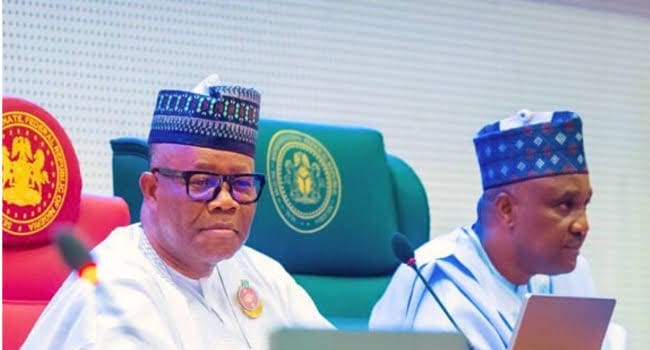A lawsuit filed by the Socio-Economlic Rights and Accountability Project (SERAP) has challenged the handling of National Assembly allowances and running costs by
Senate President Godswill Akpabio and Speaker of the House of Representatives Tajudeen Abbas have both been dragged to court by the Socio-Economic Rights and Accountability Project (SERAP) over the handling of National Assembly allowances and running costs.
The suit, filed at the Federal High Court in Abuja, accuses the duo of failing to address the allegedly unlawful practice of setting their own remuneration and allowances.
SERAP is seeking a court order to compel Akpabio and Abbas to end this practice and disclose the details of the monthly running costs paid to lawmakers.
“According to our information, members of the National Assembly are currently fixing their own salaries, allowances and running costs. The running costs are reportedly paid directly into the personal accounts of members.”
“Senator Kawu Sumaila, representing Kano South Senatorial District, recently disclosed in an interview with BBC Hausa that each Nigerian senator earns at least N21 million monthly in running costs, salaries, and allowances.”
“Mr Sumaila reportedly said, ‘My monthly salary is less than N1 million. After deductions, the figure comes down to a little over N600,000. Given the increase effected in the Senate, each senator gets N21 million every month as running cost,” SERAP said.
According to SERAP, former President Olusegun Obasanjo recently alleged that lawmakers set their own salaries and allowances, contrary to the guidelines of the Revenue Mobilisation Fiscal Allocation Commission (RMAFC). This practice, SERAP argues, breaches the Nigerian Constitution and financial regulations.
The lawsuit also calls for an order to compel Akpabio and Abbas to end the practice of paying these funds into lawmakers’ personal accounts and to refer allegations of misuse to anti-corruption agencies for investigation and prosecution.
SERAP contends that such practices are inconsistent with the constitutional oath of office and international anti-corruption commitments, stressing that transparency and accountability are crucial for maintaining public trust in democratic institutions.
The suit seeks to direct and compel Akpabio and Abbas to refer allegations of misuse of running costs to appropriate anti-corruption agencies for investigation and prosecution where there is relevant admissible evidence.
The court has yet to schedule a hearing date for the case.






